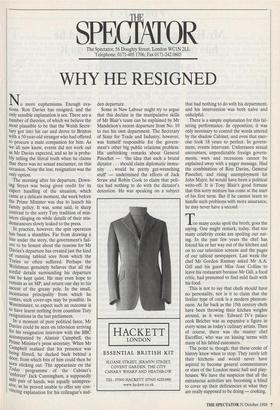SPECTATOR
The Spectator, 56 Doughty Street, London WC1N 2LL Telephone: 0171-405 1706; Fax 0171-242 0603
WHY HE RESIGNED
No more euphemisms. Enough eva- sions. Ron Davies has resigned, and the only sensible explanation is sex. There are a number of theories, of which we believe the most plausible to be that the Welsh Secre- tary got into his car and drove to Brixton with a 50-year-old stranger who had offered to procure a male companion for him. As we all now know, events did not work out as Mr Davies expected, and so he is proba- bly telling the literal truth when he claims that there was no sexual encounter, on this occasion. None the less, resignation was the only option.
The morning after his departure, Down- ing Street was being given credit for its expert handling of the situation, which Came at a delicate moment, the week before the Prime Minister was due to launch his family policy. It was, some said, in sharp contrast to the sorry Tory tradition of min- isters clinging on while details of their mis- demeanours slowly leaked to the press.
In practice, however, the spin operation has been a shambles. Far from drawing a line under the story, the government's fail- ure to be honest about the reasons for Mr Davies's departure has created just the kind of running tabloid sore from which the Tories so often suffered. Perhaps the Welshman genuinely believes that all the sordid details surrounding his departure can be kept quiet. He may even hope to remain as an MP, and return one day to his ascent of the greasy pole. In the small, incestuous principality from which he Comes, such cover-ups may be possible. In Westminster, to expect such an outcome is to have learnt nothing from countless Tory resignations in the last parliament. In a moment of pure political farce, Mr Davies could be seen on television arriving for his resignation interview with the BBC accompanied by Alastair Campbell, the Prune Minister's press secretary. When Mr Campbell realised that his presence was being filmed, he ducked back behind a door, from which bits of him could then be Seen sticking out. The appearance on the Today programme of the Cabinet's enforcer' Jack Cunningham, a supposedly safe pair of hands, was equally unimpres- sive, as he proved unable to offer any con- vincing explanation for his colleague's sud- den departure.
Some in New Labour might try to argue that this decline in the manipulative skills of Mr Blair's team can be explained by Mr Mandelson's recent departure from No. 10 to run his own department. The Secretary of State for Trade and Industry, however, was himself responsible for the govern- ment's other big public relations problem. His unthinking remarks about General Pinochet — 'the idea that such a brutal dictator . . . should claim diplomatic immu- nity . . . would be pretty gut-wrenching stuff' — undermined the efforts of Jack Straw and Robin Cook to claim that poli- tics had nothing to do with the dictator's detention. He was speaking on a subject that had nothing to do with his department, and his intervention was both naive and unhelpful.
There is a simple explanation for this fal- tering performance. In opposition, it was only necessary to control the words uttered by the shadow Cabinet, and even that exer- cise took 18 years to perfect. In govern- ment, events intervene. Unforeseen sexual encounters, unpredictable foreign govern- ments, wars and recessions cannot be explained away with a pager message. Had the combination of Ron Davies, General Pinochet, and rising unemployment hit John Major, he would have been a political write-off. It is Tony Blair's good fortune that this sorry mixture has come at the start of his first term. But if he cannot learn to handle such problems with more assurance, he may never have a second.
To many cooks spoil the broth, goes the saying. One might remark, today, that too many celebrity cooks are spoiling our eat- ing. In the past few years the chef has forced his or her way out of the kitchen and on to our television screens and the pages of our tabloid newspapers. Last week the chef Mr Gordon Ramsay asked Mr A.A. Gill and his guest Miss Joan Collins to leave his restaurant because Mr Gill, a food critic, had presumed to find mild fault with his food.
This is not to say that chefs should have no personality, nor is it to claim that the livelier type of cook is a modern phenom- enon. As far back as the 15th century chefs have been throwing their kitchen weights around, as it were. Edward IV's palace cook Belcher was as expansive a figure in every sense as today's culinary artists. Then of course, there was the master chef Escoffier, who was on kissing terms with many of his fabled customers.
The point is, though, that these cooks of history knew when to stop. They rarely left their kitchens and would never have aspired to become general commentators or stars of the London music hall and play- houses. We have the suspicion that all the extraneous activities are becoming a blind to cover up their deficiencies at what they are really supposed to be doing — cooking.


















































































 Previous page
Previous page